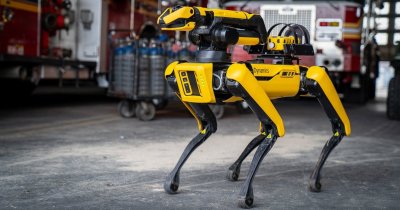Boston Dynamics' Atlas Achieves Humanlike Movement with Single AI Model Breakthrough
@devadigax03 Sep 2025

Boston Dynamics, the robotics company renowned for its impressive humanoid robots, has announced a significant advancement in artificial intelligence for robotics. Their flagship robot, Atlas, can now perform both locomotion (walking) and manipulation (grasping) tasks using a single AI model. This marks a substantial leap toward the development of more versatile and adaptable robots capable of handling a wider range of real-world tasks. Previously, separate AI models were typically required for different robot functions, resulting in more complex systems and reduced efficiency.
This breakthrough represents a major shift in the field of robotics. For years, researchers have strived to create general-purpose robots, machines that can adapt to diverse situations without requiring extensive reprogramming or model retraining for each new task. The complexity of integrating multiple AI models, each specializing in a particular function, has been a major hurdle. This integration often leads to unforeseen conflicts and limitations in the robot's overall performance and ability to seamlessly transition between different actions. The single-model approach promises to overcome many of these limitations.
The new system utilizes a deep learning model capable of learning and executing a vast array of complex movements. Instead of relying on separate models for walking and grasping, Atlas's new AI processes both functions simultaneously. This unified approach not only simplifies the overall system architecture but also enhances the robot's ability to perform tasks that require coordinated movements, such as picking up an object while walking or navigating complex terrain while carrying an item.
The implications of this advancement extend far beyond the capabilities of a single robot. The underlying AI techniques employed by Boston Dynamics could pave the way for the development of more sophisticated robots for a variety of industries. Imagine robots capable of working in disaster relief scenarios, navigating unpredictable environments, and assisting humans in a multitude of ways. The ability to perform intricate tasks with a single, unified AI model drastically simplifies the design and deployment of these robots.
The successful implementation of a single AI model for such diverse functions like walking and grasping suggests that the path towards more general-purpose robots is becoming increasingly clear. This represents a crucial step towards achieving artificial general intelligence (AGI) in robotics, although AGI remains a distant and ambitious goal. However, progress towards AGI frequently involves these incremental but vital improvements in AI's capacity for learning and adaptation. The ability of an AI to generalize its knowledge from one task to another is a key indicator of its advancement towards a more generalized intelligence.
This accomplishment also highlights the ongoing progress in the field of reinforcement learning, a crucial technique within AI. Reinforcement learning algorithms allow robots to learn by trial and error, receiving rewards for successful actions and penalties for failures. The development of sophisticated reward functions and training environments is essential for robots to acquire the skills needed to execute complex tasks. Boston Dynamics likely leveraged advanced reinforcement learning techniques to train Atlas's single AI model to master both locomotion and manipulation tasks seamlessly.
The details regarding the specific architecture of the AI model and training methodology employed remain undisclosed by Boston Dynamics. However, the sheer accomplishment itself indicates a remarkable level of advancement in both hardware and software capabilities. Future iterations may well focus on expanding the range of tasks the single AI model can handle, potentially including more complex interactions with the environment and increased dexterity.
While the implications of this breakthrough are significant, challenges remain. The robustness of the single AI model in unpredictable situations still needs further evaluation. Adapting the system to handle diverse environments and unexpected events is crucial for real-world applications. Nevertheless, Boston Dynamics' achievement signals a significant step towards creating robots that are truly versatile and capable of seamlessly interacting with the human world. This could herald a new era of more adaptable, efficient, and impactful robotics across diverse sectors.
This breakthrough represents a major shift in the field of robotics. For years, researchers have strived to create general-purpose robots, machines that can adapt to diverse situations without requiring extensive reprogramming or model retraining for each new task. The complexity of integrating multiple AI models, each specializing in a particular function, has been a major hurdle. This integration often leads to unforeseen conflicts and limitations in the robot's overall performance and ability to seamlessly transition between different actions. The single-model approach promises to overcome many of these limitations.
The new system utilizes a deep learning model capable of learning and executing a vast array of complex movements. Instead of relying on separate models for walking and grasping, Atlas's new AI processes both functions simultaneously. This unified approach not only simplifies the overall system architecture but also enhances the robot's ability to perform tasks that require coordinated movements, such as picking up an object while walking or navigating complex terrain while carrying an item.
The implications of this advancement extend far beyond the capabilities of a single robot. The underlying AI techniques employed by Boston Dynamics could pave the way for the development of more sophisticated robots for a variety of industries. Imagine robots capable of working in disaster relief scenarios, navigating unpredictable environments, and assisting humans in a multitude of ways. The ability to perform intricate tasks with a single, unified AI model drastically simplifies the design and deployment of these robots.
The successful implementation of a single AI model for such diverse functions like walking and grasping suggests that the path towards more general-purpose robots is becoming increasingly clear. This represents a crucial step towards achieving artificial general intelligence (AGI) in robotics, although AGI remains a distant and ambitious goal. However, progress towards AGI frequently involves these incremental but vital improvements in AI's capacity for learning and adaptation. The ability of an AI to generalize its knowledge from one task to another is a key indicator of its advancement towards a more generalized intelligence.
This accomplishment also highlights the ongoing progress in the field of reinforcement learning, a crucial technique within AI. Reinforcement learning algorithms allow robots to learn by trial and error, receiving rewards for successful actions and penalties for failures. The development of sophisticated reward functions and training environments is essential for robots to acquire the skills needed to execute complex tasks. Boston Dynamics likely leveraged advanced reinforcement learning techniques to train Atlas's single AI model to master both locomotion and manipulation tasks seamlessly.
The details regarding the specific architecture of the AI model and training methodology employed remain undisclosed by Boston Dynamics. However, the sheer accomplishment itself indicates a remarkable level of advancement in both hardware and software capabilities. Future iterations may well focus on expanding the range of tasks the single AI model can handle, potentially including more complex interactions with the environment and increased dexterity.
While the implications of this breakthrough are significant, challenges remain. The robustness of the single AI model in unpredictable situations still needs further evaluation. Adapting the system to handle diverse environments and unexpected events is crucial for real-world applications. Nevertheless, Boston Dynamics' achievement signals a significant step towards creating robots that are truly versatile and capable of seamlessly interacting with the human world. This could herald a new era of more adaptable, efficient, and impactful robotics across diverse sectors.
Comments
Related News

Beyond the Mic: Instagram Denies Eavesdropping, But AI's Predictive Power Redefines Digital Privacy
@devadigax | 01 Oct 2025
@devadigax | 01 Oct 2025

Microsoft 365 Premium Redefines AI Productivity, Bundling Copilot to Rival ChatGPT Plus Pricing
@devadigax | 01 Oct 2025
@devadigax | 01 Oct 2025

Wikimedia's Grand Vision: Unlocking Its Vast Data Universe for Smarter Discovery by Humans and AI
@devadigax | 30 Sep 2025
@devadigax | 30 Sep 2025

Google Drive Fortifies Defenses with New AI-Powered Ransomware Detection
@devadigax | 29 Sep 2025
@devadigax | 29 Sep 2025

The DeepSeek Phenomenon: Unpacking the Viral AI Chatbot from a Leading Chinese Lab
@devadigax | 29 Sep 2025
@devadigax | 29 Sep 2025
 AI Tool Buzz
AI Tool Buzz